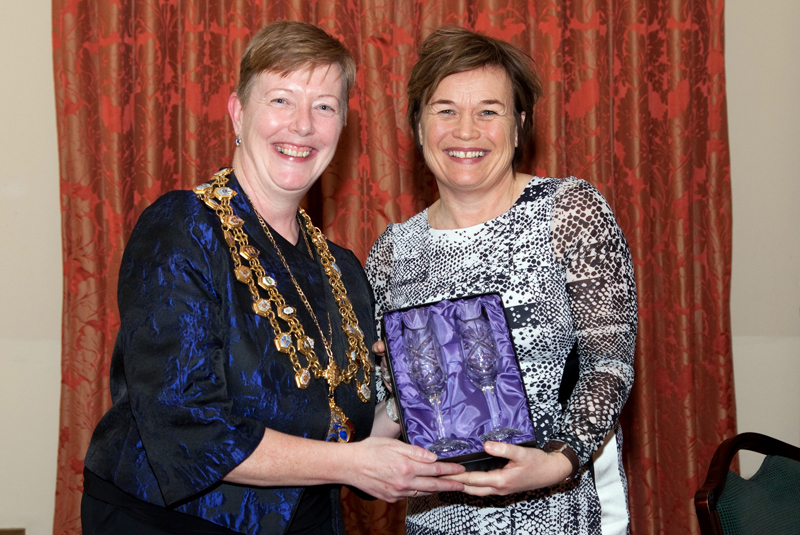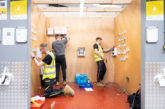
Kirstie Donnelly, MBE, Managing Director at the City & Guilds Group, recently delivered a keynote speech at the CIPHE annual President’s Dinner about why apprenticeship schemes are crucial for bridging the widening skills gap in the industry.
I recently had the honour of being a guest speaker at the CIPHE’s President’s Dinner, an opportunity made even more special by the presence of Tracey Richardson, President, and Dame Fiona Woolf, Master of the Worshipful Company of Plumbers, who are both fantastic role models for women seeking to enter the plumbing and heating industry. Indeed, it was on the theme of entering the profession and embarking upon a career as a plumbing or heating engineer, that my speech was primarily focused upon.
The City & Guilds Group is dedicated to providing skills development opportunities, an objective which aligns closely with that of the Institute’s. The fluctuating popularity of apprenticeships presents a threat, but is also an opportunity to address the skills gap that we face.
Trades operating in this sector have traditionally and consistently applied the apprenticeship model to create a pipeline of skilled talent, which has helped to equip existing workforces with the right combination of competencies for today, and for the future.
As part of my speech I asked the audience to raise their hands, by way of showing who had started their career as an apprentice, to which the majority of the room responded positively. In a room full of industry leaders, this really highlights the importance of apprenticeship schemes, and shows just how far you can go by choosing this career entry point.
The challenge of recruiting
The City & Guilds Group recently conducted some research into the area of recruitment. The results showed that 89% of UK employers are struggling to recruit staff that are sufficiently skilled, with 63% believing that the skills gaps in their businesses are likely to get worse over the next three to five years.
Clearly, there is a need to develop home-grown talent, in order to bridge this growing problem. Apprenticeships are a massive part of the solution, given their potential to provide learners at all levels, in a hands-on and practical way.
They differ from the higher education route in this regard, which has long been lauded as the Holy Grail of achievement by successive governments. The need to emphasise an apprenticeship or technical route to employment has never been greater, not least because there has been research to suggest that by 2022, only 30% of jobs will require graduate-level academic qualifications.
The City & Guilds Plumbing and Heating Apprenticeship Standard is an example of a recently launched scheme – which is actually one of the new trailblazer apprenticeships – that recognises the engineering discipline required to pursue a career in this industry.
Ongoing learning
Engineers are required to continually learn even after gaining qualifications, by keeping abreast of legislative and technological changes that affect their work. The fact that mistakes can have severe life-impacting consequences, such as through scalding incidents or Legionella cases, means that installers are obligated to strive for professionalism.
This is what makes the work of the CIPHE so important, especially in its promotion of Continuing Professional Development (CPD). By creating a platform which makes CPD as straightforward as possible, hosted on its website with tips and administrative support, the Institute continues to help its members upskill, with the ultimate aim of protecting the public and those most vulnerable in society.
Diligent members of the industry will appreciate how an organisation such as the CIPHE can support their development needs. Apprenticeships are an integral building block of this process, as is the provision of clear progress routes from one level to the next, i.e. intermediate (L2) to advanced (L3).
Along with being trained in the knowledge, skills, and core behaviours for all aspects of plumbing and heating systems, apprentices are equipped with skills for the future. This means that they will be at the forefront of responding to a changing industry – installing new and exciting environmental technologies like heat pumps, solar thermal systems, biomass boilers, and water recycling systems.
The skills gap is a challenge that needs addressing, and it is my belief that the primary way to do this is to focus on providing high-quality apprenticeships and encourage more young people to start their careers in this way. However, we can only create these high-quality routes by working together, which involves promoting the benefits to the education delivery side too. Everyone in the industry has a part to play and a responsibility to leave the sector in a better position than they inherited it in. That is how continual improvement will be delivered.













